What an Old Horse Can Teach—by T. K. Thorne
Writer, humanist,
dog-mom, horse servant and cat-slave,
Lover of solitude
and the company of good friends,
New places, new ideas
and old wisdom.
This winter during the Covid pandemic, I did a crazy thing. I got two rescue horses. I was only looking for one mare to keep our lonesome gelding company. Still can’t believe I bought a horse from a photograph on Facebook! But a local rescue organization directed me to look there, and I saw a beautiful bay thoroughbred named Foxy who had raced for a couple of years and then was sold at auction. A place in Louisiana had bought her at the auction. Their aim was to sell her again, but such places, though they claim to be rescuing horses, are often not really focused on that. The real rescue organizations call them”kill pens.” As the term implies, if they can’t resell a horse, they send it to Mexico for dog food. It’s illegal to buy or sell a horse for food in the U. S., but not in Mexico. And there is a steady stream of unwanted horses from the U.S. for that purpose.
Foxy traveled from Louisiana to Alabama with several other horses who had been purchased the same way. One of her fellow travelers from the kill pen was an older black Standardbred mare named Nickie Jones. Originally raced at a track (pulling a two-wheeled one-seater called a “sulky”) and then sold to the Amish who had her pull a carriage or wagon. The Amish had sold her to the same Louisiana kill pen. Had someone not bought her in the same way I had, Nickie’s next stop also would have been Mexico.
She turned out to be lame and had a terrible scar on her left back leg (something not disclosed when her would-be rescuer bought her. Nickie Jones was no longer wanted by the person who had purchased her. The rescue organization couldn’t keep her, because there were stallions on their property, and mares cause a lot of stir. (No comments from the peanut gallery, please.)
So, to make a long story short, I took in Nickie Jones too. Both horses were not in great shape, but Nickie was really undernourished.
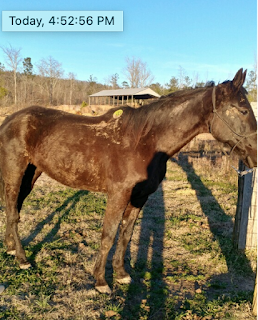 |
|
| Nickie Jones Arrival Feb 2, 2021 |
Whatever she had gotten into (barbed wire?) to leave an awful scar, seemed to be causing her pain, but when my vet examined her, he said t was her other leg, the hock (back “elbow”) that was swollen and the reason she was lame. I gave her Bute, which is horse aspirin, as a powder mixed in her feed for about ten days, and she was fine. Putting some weight on her took longer. A special senior feed and lots of hay. She gobbles it down and is the first one to the three piles of hay we lay out for them. The bony top of her hip is starting to round.
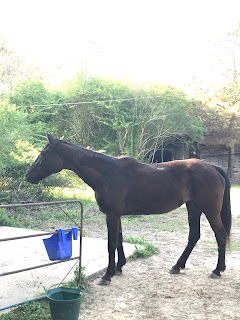 |
|
| Nickie Jones April, 2021 |
Horses are social creatures, and they adhere to a hierarchy each group works out. Nickie Jones is at the bottom of line. Big boss man in this herd-of-three is Apollo, our paint (brown and white) quarter horse. He is ordinarily congenial, but food aggressive. When food is present, he turns into a bully. We quickly learned we needed to put him in the round pen to eat until the other two are finished or he will run them off from their buckets and help himself to their grain.
The routine is to give all three grain in their individual buckets. While they eat, we put out the hay in three piles in a rough line against the barn wall. Usually Nickie Jones finishes first and heads for the hay. Then Foxy joins her. Then we let Apollo out of the pen. When released, he exits the pen with his ears flattened back, charging the girls. They scatter. So, he gets first choice of the three piles of hay to munch. Sometimes he will choose the hay on the far end, sometimes the other end. He never chooses the center. Foxy uses her position as horse #2 to claim the end farthest away from Apollo, putting Nickie Jones between her and the grumbly gelding.
Smart girl.
Nickie Jones has disadvantages. We don’t know if she was born into them or if personality, age, or injury created them. There is not much she can do about that. But even though she has the least social status and control, knowing she will end up in the middle of the hay line, she uses the moments when she is first to the hay—before Foxy finishes her grain and Apollo is released—to snatch at a pile, and she never eats from the middle pile, which is where she will end up.
Foxy is the second to finish her grain and go to the hay. If Foxy runs Nickie Jones off from an end pile, Nickie goes to the other end, getting a few snatches of that pile of hay before Apollo comes out and everyone reshuffles and ends up in their final hay-eating positions. Nickie Jones always has an untouched pile of hay in the center to munch.
There’s smart and there’s smart.
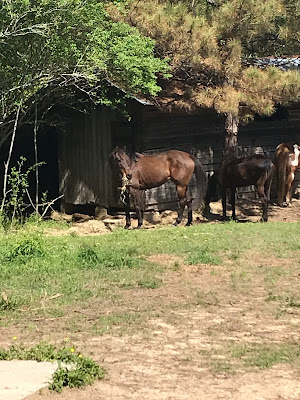 |
|||
| Left to right: Foxy, Nickie Jones, Apollo |
T.K. is a retired police captain who writes Books, which, like this blog, go wherever her interest and imagination take her. More at TKThorne.com


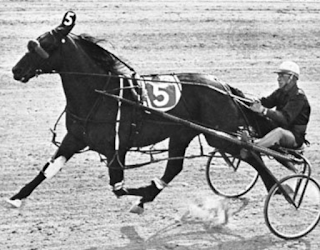




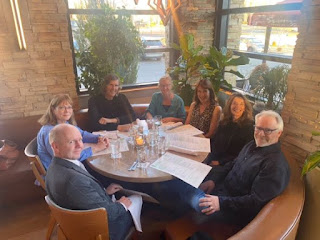
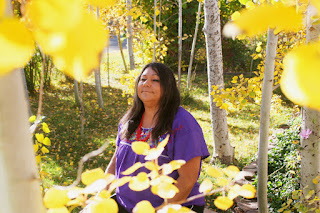
T.K., you've done a wonderful thing rescuing these two horses. And you write about them with such a big heart. Hmm, just like the big heart in ALL of your writing 🙂
Thank you, Barbara. Means a lot!
What a wonderful happy ending for Foxie, Nickie Jones and Apollo. And education as well, thank you, T.K.
Thanks for stopping by and leaving a note, Donnell!
I love it that you've rescued horses, and especially that they enrich your life with these fascinating lessons. My niece is a horse vet, and I've learned so much from her about the care and use of horses, not always as compassionate as yours. Thank you for sharing your humanitarian spirit with us.
Thank you, Saralyn, the horses teach much about life and interactions. They are inspiring my next book too!
Your kindness and love of animals..wow!
Thanks, Debra!